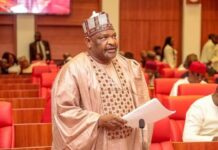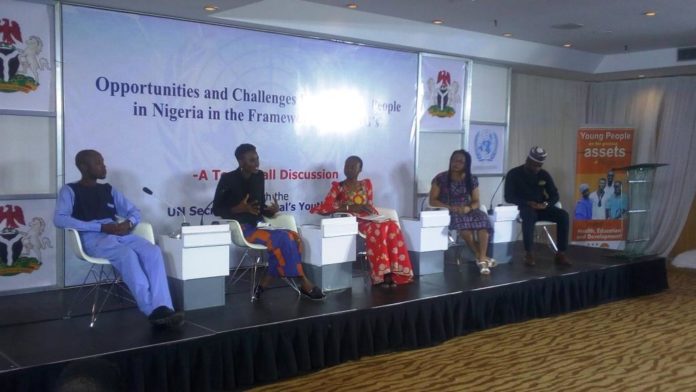The UN envoy on youth Jayathma Wickramanayake says young people are crucial to implementing the Sustainable Development Goals, which they helped craft at the end of the Millennium Development Goals in 2015.
Speaking at a townhall meeting on the first day of her visit to Nigeria, she said communication with young people was key to implementing the goals.
“It could be as simple as building an app to link local producers to market or providing sanitation facilities in an area,” she said.
“If we think SDGs without government but also without government, there are many things we can do.”
Wickramanayake’s visit is platform to harvest ideas to change global approach to issues that affect all demographics of young people.
Intergenerational dialogue has featured in the last four countries Wickramanayake has visited before Nigeria.
“You are young but you are not always going to be young. You are old but you were not always old. We need yo find ways of creating that conversation between generations,” said Wickramanayake.
SDGs come under intense scrutiny, considering the opportunities and challenges facing young people.
Each goal doesn’t “stand alone”, but the issue is how to do it together, said Olabukunola Williams, programme coordinator at Nigerian Women in Agricultural Research for Development.
“Peace and security is just as important to young people; it changes the dynamics of their life, where they are able to go,” said Williams.
She also raised concern about how to collect data to show achievement for young people.
Sexual and reproductive health is also on the agenda and has been a difficult topic in especially northern Nigeria.
Shamwil Hassan, president of UNFPA youth advisory group, said the resistance has prompted the creation of “safe space clubs”–an addition to young women’s education, creating physical spaces where they can talk about their sexual and reproductive health and rights without stigma.
It is also linked to complications, abortions, morbidities and pregnancy-related deaths.
“We have a lot of teenage pregnancies in northern Nigeria, but they are not admitting it,” said Hassan.
“These young girls aren’t swallowing [pregnancies like pills]. They are having sex, but we don’t admit it to talk about sexual and reproductive health.”
Hassan said training young advocates to provide SRH services and commodities enable girls to speak freely without being judged.
“If we harness the potential and power of young people, it will solve the health problems,” he noted.
Florida Uzoalu set up Slide Safe Box, a social enterprise model to deliver sexual and reproductive health commodities.
“The way sex is talked about in public is totally different from how sex happens in private,” said Uzoalu.
“In pretending that not talking about it means people won’t do it, they will only have more dangerous sex.”
Making and changing decisions is all politics, said Samson Itodo, executive director of Youth Initiative for Advocacy, Growth and Advancement.
“We constitute the largest bulk of our population and we must go beyond registering to vote to actually standing to be voted,” he said.
























